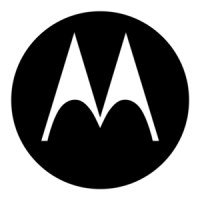22 System Feature Overview
2.2.3 MOTOTRBO Channel Access
Channel access dictates what conditions a radio is allowed to initiate a transmission on a channel.
The channel access rules of MOTOTRBO are governed by the mobile and portable radios. It is the
radio’s responsibility to assess the state of the system, and utilize its channel access rules to
decide whether to grant the call to the user.
In repeater systems, it is the repeater’s responsibility to:
• Identify if a channel is busy, or
• Identify if a channel is idle, or
• Inform for which radio the channel is reserved.
The repeater does not block or deny any channel access from radios on its system, but will not
repeat transmissions from another system.
There are two main types of channel access in a MOTOTRBO system: Polite and Impolite access.
In the configuration software, channel access is referred to as the Admit Criteria. MOTOTRBO
supports the following Admit Criteria:
• Always: This criteria is often referred to as “Impolite” channel access, and can be
applied to analog and digital channels.
• Channel Free: This criteria is often referred to as “Polite to All”, and can be applied to
analog and digital channels.
• Color Code Free: This criteria is sometimes referred to as “Polite to Own Color Code”
or “Polite to Own System”, and is applied only to digital channels.
• Correct PL: This criteria is sometimes referred to as “Polite to Other System”, and is
applied only to analog channels. The radio checks for a PL match prior to allowing a
transmission.
Channel access methods must be specified for each channel in the radio CPS. The TX (Transmit)
parameters for each defined channel contains an “Admit Criteria” selection that must be set to one
of the values described above.
All these channel access options govern how standard group voice calls and Private Calls access
the system. Not all transmission types utilize these settings. For example, emergency voice calls
always operate impolitely. This gives emergency voice calls a slightly higher priority over existing
traffic on the channel. Data calls are always polite. Since a data call can be queued and retried, its
priority is considered lower than voice.
Note that a “polite” radio user attempting a voice call will be polite to data, but an impolite user may
not. Control messages (used for signaling features) are also always polite. The exception is the
emergency alarm. Emergency alarms are sent with a mix of impolite and polite channel access, in
order to optimize the likelihood of successful transmission.
When the Admit Criteria is either Channel Free or Correct PL, a configurable RSSI threshold is
provided per channel in the radio. If the received signal strength is less than the configured RSSI
threshold, the signal is considered as an interference and the radio gets channel access when the
user initiates a new call. However, if the received signal strength is greater or equal to the
configured threshold, the channel is considered busy and the radio does not get channel access
when the user initiates a new call. It is the responsibility of the site planner or the service provider
to set the RSSI Threshold to an appropriate value considering the RF interference and also ensure

